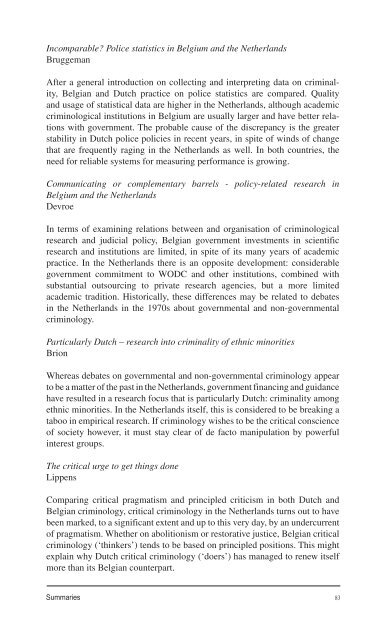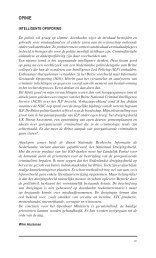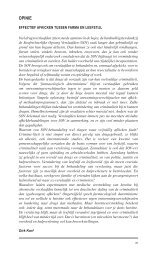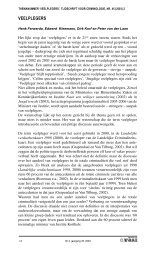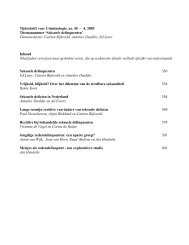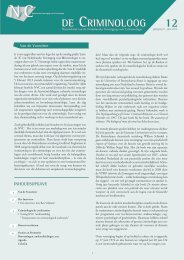Een Vlaamse spiegel - Nederlandse Vereniging voor Kriminologie
Een Vlaamse spiegel - Nederlandse Vereniging voor Kriminologie
Een Vlaamse spiegel - Nederlandse Vereniging voor Kriminologie
You also want an ePaper? Increase the reach of your titles
YUMPU automatically turns print PDFs into web optimized ePapers that Google loves.
Incomparable? Police statistics in Belgium and the Netherlands<br />
Bruggeman<br />
After a general introduction on collecting and interpreting data on criminality,<br />
Belgian and Dutch practice on police statistics are compared. Quality<br />
and usage of statistical data are higher in the Netherlands, although academic<br />
criminological institutions in Belgium are usually larger and have better relations<br />
with government. The probable cause of the discrepancy is the greater<br />
stability in Dutch police policies in recent years, in spite of winds of change<br />
that are frequently raging in the Netherlands as well. In both countries, the<br />
need for reliable systems for measuring performance is growing.<br />
Communicating or complementary barrels - policy-related research in<br />
Belgium and the Netherlands<br />
Devroe<br />
In terms of examining relations between and organisation of criminological<br />
research and judicial policy, Belgian government investments in scientific<br />
research and institutions are limited, in spite of its many years of academic<br />
practice. In the Netherlands there is an opposite development: considerable<br />
government commitment to WODC and other institutions, combined with<br />
substantial outsourcing to private research agencies, but a more limited<br />
academic tradition. Historically, these differences may be related to debates<br />
in the Netherlands in the 1970s about governmental and non-governmental<br />
criminology.<br />
Particularly Dutch – research into criminality of ethnic minorities<br />
Brion<br />
Whereas debates on governmental and non-governmental criminology appear<br />
to be a matter of the past in the Netherlands, government financing and guidance<br />
have resulted in a research focus that is particularly Dutch: criminality among<br />
ethnic minorities. In the Netherlands itself, this is considered to be breaking a<br />
taboo in empirical research. If criminology wishes to be the critical conscience<br />
of society however, it must stay clear of de facto manipulation by powerful<br />
interest groups.<br />
The critical urge to get things done<br />
Lippens<br />
Comparing critical pragmatism and principled criticism in both Dutch and<br />
Belgian criminology, critical criminology in the Netherlands turns out to have<br />
been marked, to a significant extent and up to this very day, by an undercurrent<br />
of pragmatism. Whether on abolitionism or restorative justice, Belgian critical<br />
criminology (‘thinkers’) tends to be based on principled positions. This might<br />
explain why Dutch critical criminology (‘doers’) has managed to renew itself<br />
more than its Belgian counterpart.<br />
Summaries<br />
83


